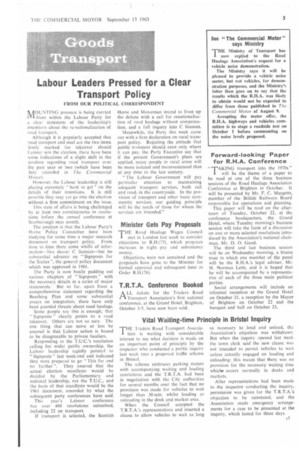Labour Leaders Pressed for a Clear Transport Policy
Page 7

If you've noticed an error in this article please click here to report it so we can fix it.
FROM OUR POLITICAL CORRESPONDENT NAOUNTING pressure is being exerted from within the Labour Party for a clear statement of the leadership's intentions about the re-nationalization of road transport.
Although it is popularly accepted that road transport and steel are the two items Iirmly marked for takeover should Labour win the election, there have been some indications of a slight shift in the position regarding road transport over the past year or two (which have been duly recorded in The Commercial Motor).
However, the Labour leadership is still playing extremely "hard to get" on the details of their intentions. It is still possible they may yet go into the election without a firm commitment on the issue.
This state of affairs is being challenged by at least two constituencies in resolutions before the annual conference at Scarborough next month.
The position is that the Labour Party's Home Policy Committee have been studying for some time a major research document on transport policy. From time to time there come whiffs of information—like dearer C licences—but no substantial advance on "Signposts for the Sixties the general policy document which was approved in 1961.
'the Party is now busily padding out various chapters of "Signposts" with the necessary details in a series of major statements. But so far, apart from a comprehensivse statement regarding the Beeching Plan and some substantial essays on integration, there have only been guarded threats about road haulage.
Some people say this is enough; that " Signposts " clearly points to a road takeover. Others are not so sure. The one thing that can more or less he assured is that Labour action is bound In be disagreeable to private hauliers.
Responding to the T.U.C.'s resolution calling for wider public ownership, the Labour leadership rapidly pointed to "Signposts" last week-end and indicated they were prepared to go This far and no further ". They assured that the actual election manifesto would be decided by the Parliamentary and national leadership, not the T.U.C., and the basis of that manifesto would be the 1961 document, amended by what the subsequent party conferences have said.
This year's Labour conference has over 400 resolutions submitted, including 22 on transport.
If transport is selected, the Scottish
Horse and Motormen intend to liven up the debate with a call for zenationalisation of road haulage without compensation, and a full inquiry into C licences.
Meanwhile, the Party this week came out with a firm declaration on rural transport policy. Rejecting the attitude that public transport should exist only where it can pay. the Party Executive say that if the present Government's plans are applied, many people in rural areas will he more isolated and inconvenienced than at any time in the last century.
" The Labour Government will pay particular attention to maintaining adequate transport services, both rail and road, in the countryside. In the provision of transport and other basic community services, our guiding principle will be the needs of those for whom the services are intended."
Minister Gets Pay Proposals
THE Road Haulage Wages Council met in London last week to consider objections to R.H.(75), which proposes increases in night pay and subsistence money.
Objections were not sustained and the proposals have gone to the Minister for formal approval and subsequent issue as Order R.H.(76).
T.R.T.A. Conference Booked




















































































































